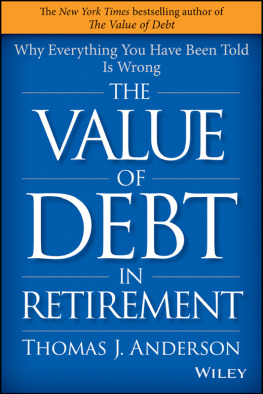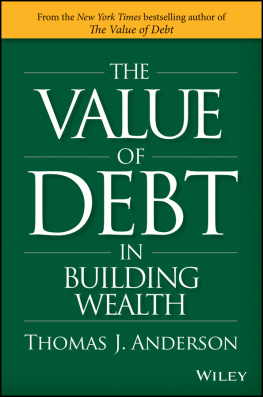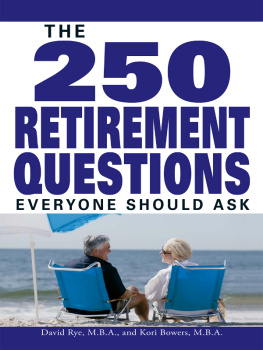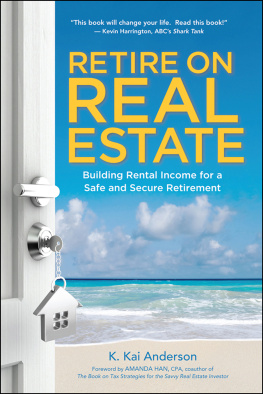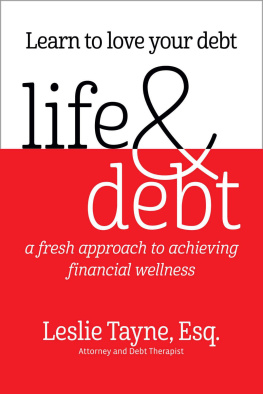Thomas J. Anderson - The Value of Debt in Retirement: Why Everything You Have Been Told Is Wrong
Here you can read online Thomas J. Anderson - The Value of Debt in Retirement: Why Everything You Have Been Told Is Wrong full text of the book (entire story) in english for free. Download pdf and epub, get meaning, cover and reviews about this ebook. year: 2015, publisher: Wiley, genre: Business. Description of the work, (preface) as well as reviews are available. Best literature library LitArk.com created for fans of good reading and offers a wide selection of genres:
Romance novel
Science fiction
Adventure
Detective
Science
History
Home and family
Prose
Art
Politics
Computer
Non-fiction
Religion
Business
Children
Humor
Choose a favorite category and find really read worthwhile books. Enjoy immersion in the world of imagination, feel the emotions of the characters or learn something new for yourself, make an fascinating discovery.
- Book:The Value of Debt in Retirement: Why Everything You Have Been Told Is Wrong
- Author:
- Publisher:Wiley
- Genre:
- Year:2015
- Rating:4 / 5
- Favourites:Add to favourites
- Your mark:
The Value of Debt in Retirement: Why Everything You Have Been Told Is Wrong: summary, description and annotation
We offer to read an annotation, description, summary or preface (depends on what the author of the book "The Value of Debt in Retirement: Why Everything You Have Been Told Is Wrong" wrote himself). If you haven't found the necessary information about the book — write in the comments, we will try to find it.
Thought provoking and against the grain, Anderson explains why your risk tolerance doesnt matter, why being debt free may actually increase your risk and why rushing to pay off your mortgage may be a financial disaster. Full of shocking revelations and tricks high- net-worth individuals have used for years, The Value of Debt in Retirement opens the world to a new approach to wealth management in retirement, one that factors in both sides of the balance sheet as an integrated ecosystem.
Real-world case studies illustrate how informed debt strategies can lead to a happier, healthier retirement. See how an individual with a net worth of more than $5 million can spend $20,000 per month - after taxes - and pay less than $5,000 per year in taxes, how it is possible to increase your rate of return by 50%, and how a lower risk portfolio with debt could increase the chances you do not run out of money.
Specifically written to Baby Boomers, practical guides and checklists show how to use debt strategies to fund primary and secondary properties, refinance credit card debt, and finance hobbies, such as cars and boats and recreational vehicles. Additional guides show how you can help your children, help your parents and leave a bigger legacy for your heirs and favorite charities. Regardless of your net worth, The Value of Debt in Retirement provides tools to use to apply these concepts to your personal situation.
There is no free lunch: the book delivers a balanced perspective focusing on the potential risks and benefits of the strategies discussed. A discussion on economic history highlights some of the shocks the economy may face and provides important warnings that you should factor into your retirement plan. Anderson not only shows that your life expectancy may be longer than you think, but also illustrates that many investors may be on track to average returns well under 4% for the next ten years - a potentially devastating combination. Irrespective of your beliefs about debt, The Value of Debt in Retirement proves risk is more important than return for retirees and provides suggestions on ways to minimize that risk.
Not all debt is good and high levels of debt are bad. The Value of Debt in Retirement is about choosing the right debt, in the right amounts, at the right time. Perhaps most importantly, this book isnt for everybody. This book requires responsible actions. If you cant handle the responsibility associated with the ideas then this book then it isnt for you. If you need a rate of return under 3% from your investments then you may not need this book. But if you can handle the responsibility and if you need a return above 3%, this book may offer insights into the best (and potentially only) way to achieve your goals.
Thomas J. Anderson: author's other books
Who wrote The Value of Debt in Retirement: Why Everything You Have Been Told Is Wrong? Find out the surname, the name of the author of the book and a list of all author's works by series.

